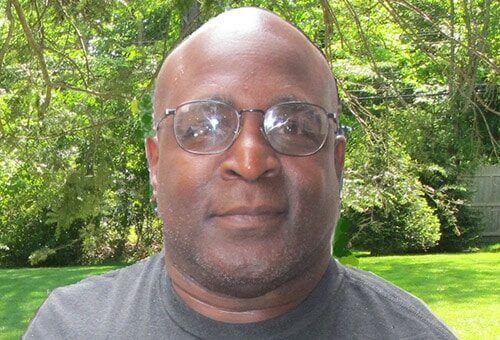Shawn is no stranger to hardship. It defined his story for decades, beginning with a childhood under an abusive single mother struggling with five children. “My mother drank,’’ he said. “Her favorite line to us was, ‘You’re shit. You’ll never amount to anything.’’’
By the time he was 16, Shawn was selling heroin on the streets. For much of the 1980s and 1990s, he was selling drugs, getting high, and shuttling in and out of jail, mostly for petty crimes. He said he was sent behind bars “50 something times.”
Shawn was sentenced in 1983 to serve three years in New York State’s Sing Sing Prison for selling controlled substances. Not long after his release in 1986, he was introduced to crack.
“I smoked it and it seemed like I fell in love,” Shawn remembered. “I felt like I had courage. I felt like I had self esteem.”
“It was all an illusion,” he added.
It took more than a decade to figure that out, though. He kept moving among jails, drug treatment programs and life on the streets, selling and using hard drugs.
The last time he was sent to Rikers Island, he was there for four months. Upon his release in 1999, Shawn decided that it was time for a change: time to stop being ruled by his drug habit and to make meaningful changes to his life. He was 37 years old.
“I had had enough,” he said. “I said to myself, ‘What do I have to do to change this?’”
What he learned, one step at a time, was how to ask for help. “I thought I could do it all myself,” he said. “We all need some guidance. That’s what I had to incorporate into my life. I only learned that through The Doe Fund.”
“The place was immaculate, and the food was so good,” he said, recalling his first impressions upon arriving at the Gates Avenue transitional residence in Brooklyn.
“I cried that first day, because I couldn’t believe where I was at,” he remembered. “And I just felt it was a beginning, something different for me.”
Shawn was the grateful recipient of lots of support and encouragement at Gates Avenue. Nazerine Griffin Jr., a former Doe Fund trainee who by then had become the center’s program director, was a particular source of inspiration. “Naz told us he’d lived on the second floor,” Shawn said. “‘I come from the same place, I’m no different from you.’”
He paid attention to the rules, and he began to thrive. He worked on a crew that did basic demolition on abandoned buildings owned by the city in Harlem, the South Bronx and Queens.
Shawn took part in a life skills class. He reapplied for a driver’s license, and he obtained a new copy of his birth certificate. After nine months, he was sent to The Doe Fund’s Harlem residential center for job development. He and other trainees were given shirts and ties and were taught how to present themselves at a job interview. They participated with staff in mock interviews.
While still living at Gates Avenue, Shawn earned a security job with The Doe Fund. One day, he received a call from Carol Tannenhauser, who oversaw the organization’s job center: would he be interested in a part-time position at an apartment building owned by her husband? Shawn went to work at the building, Ruxton Towers at 50 West 72nd Street, for nearly twenty years.
By the time Shawn moved out of Gates Avenue, after 14 months, he had saved $5,200—more than enough to rent his own place and pay a deposit. He got an apartment five blocks from Gates Avenue, where he continued to go to meetings. In many ways, it was home. He stayed in that apartment for five years.
In 2013, Shawn entered the College of New Rochelle while still working full-time, later graduating with a degree in Psychology with Honors. He is currently a graduate student there, working towards his Masters in Mental Health Counseling.
Through his experience with The Doe Fund, Shawn came to realize his true passion: aiding others along the same path that led him to success and sobriety. He is now a recovery coach for Release Recovery, a case management and addiction treatment center, helping others reclaim their lives just as he did. Through his work at Release Recovery, Shawn has impacted the lives of countless people with his story of hope.
Looking back, Shawn said his transformation required “a moment of clarity,” the insight that he had had enough of drug addiction, homelessness, and hustling. It also required help, he said, in particular the support and encouragement of the people and programs of The Doe Fund.
“I’m grateful,” he said. “This is the best that I’ve ever lived in my life.”




